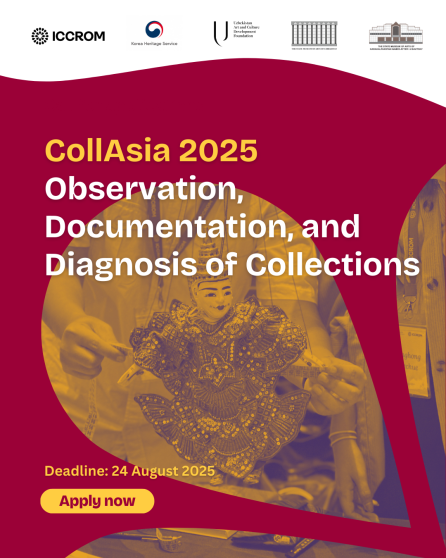Partners
- ICCROM
- NRICH - National Research Institute of Cultural Heritage, Republic of Korea
In Collaboration with:
- Uzbekistan Art and Culture Development Foundation
- The State Museum of Arts of Uzbekistan
- The State Museum of Arts of Karakalpakstan named After I.V. Savitsky
Where
The course will take place across two main venues: The State Art Museum of Uzbekistan in Tashkent and The State Musem of Arts of Karakalpakstan, named after I.V. Savitsky, in Nukus. In addition, study trips to other key cities, cultural institutions, and sites across Uzbekistan will be organized during the training programme.
Why
Sustainable conservation of heritage collections requires flexible and adaptable skills to observe, gather data, and make decisions. These competences are essential for developing informed and context-specific strategies that preserve both objects and the cultural practices they embody.
By enhancing critical thinking, interdisciplinary collaboration, and evidence-based decision-making, collections caretakers can better understand material vulnerabilities and effectively address risks, contributing to the long-term sustainability and accessibility of heritage.
What
The CollAsia 2025 course on “Observation, Documentation, and Diagnosis of Collections" will provide a space for participants to explore skills drawing from a critical thinking approach and building on basic notions required to work with collections. At the end of the course, participants will be able to:
- Increase awareness on how to apply structured documentation methods, including visual and digital tools.
- Understand the basis for scientific principles of collections care, identifying alteration and deterioration phenomena.
- Contextualize objects, practices, and behaviours towards resilient practices for conservation.
- Employ effective methods to understand locally available resources and traditional practices.
How
This three-week course will feature interactive lectures, hands-on workshops, practical exercises, and field visits led by an interdisciplinary and multicultural team. Emphasis will be placed on integrating scientific principles with traditional knowledge and materials. Participants will engage in critical group discussions, present relevant case studies from their professional experiences, and develop a project proposal aimed at enhancing sustainable collection care within their institutions.
The programme will be delivered in English.
Who Should Apply?
The course will host up to 30 participants. Eligible applicants should have at least three years of experience working with heritage collections, including but not limited to scientists, conservators, restorers, archaeologists, architects, collection managers, curators, museum educators, and other related professionals.
Course Fees and Scholarships
Selected participants will not be required to pay course fees. Scholarships will cover round-trip travel, accommodation, and meals in Uzbekistan for the duration of the course. Priority will be given to candidates from ICCROM Member States. Please note that visa fees and any other personal expenses will be the responsibility of the selected participants or their institutions.
To Apply
Interested candidates must complete the online course application form.
Required application materials:
- Portrait photo (formats: jpg, jpeg, png, tif, tiff; max. 5 MB)
- Official endorsement letter (formats: pdf, doc, docx, jpg, jpeg, png, tif, tiff; max. 5 MB)
- Curriculum Vitae (formats: pdf, doc, docx; max. 5 MB)
- Brief Report (around 500 words) answering the following exploratory questions:
- “How is observation, documentation, and diagnosis practiced in your context?” "How do sustainability and tradition play a role in your work or that of your institution?” (formats: pdf, doc, docx; max. 5 MB)
Deadline to apply: 24 August 2025
For further information, please contact collasia2025@iccrom.org

